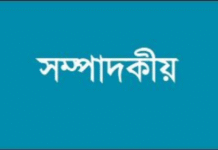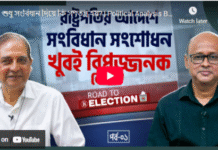Civil society is now concerned because of the diametrically opposite positions taken by the two major political parties, the Awami League (AL) and the Bangladesh Nationalist Party (BNP), regarding caretaker issue. Western diplomats in Dhaka are interacting with civil society to encourage their involvement in determining the polls-time system of government. Political analysts are saying that this is a pretext for third-party intervention. There are indications of such an eventuality. Television talk shows are debating such possibilities.
In Bangladesh, election-time uncertainties are a regular feature. Diplomats get an opportunity to play a role. This time they are meeting with politicians, editors and high-profile lawyers. Many believe that creation of a third forum will be a solution to the problem. They had a similar objective in 2007 but it did not materialise.
This time the diplomats seem to be more organised. Politicians, intellectuals, businessmen, bureaucrats and lawyers under the garb of civil society are trying to get together in a common platform. The obstinacy of the two parties is adding fuel to fire. It is learnt that home work started from the middle of 2012. The political situation in Bangladesh has become somewhat muddy. The foreigners are looking for a strategy to safeguard their interests.
Apart from the USA and European Union, China has also called upon the two ladies, Prime Minister Sheikh Hasina and Leader of the Opposition Khaleda Zia, to sit across the table to find out a solution. In the middle of this year, the UN sent a mission to Bangladesh to encourage the parties to negotiate but this did not produce any result. Now, UN Secretary General Ban Ki-moon has personally talked to the two leaders urging them to hold a dialogue. But the ice has not yet melted. Another UN delegation is expected soon. An election observer mission from the European Union is now visiting Bangladesh. They will meet the major parties and the civil society.
The forces of the new mechanism have again become active. With the apparent blessings of civil society, Prof Yunus has become vocal against government policies. Apart from Yunus, there are many other civil society leaders who are looking for an alternative scenario. Many BNP and Awami League leaders are reportedly waiting in the wings to join the civil society movement for resolving the issue.
The civil society leaders have met several times in Singapore and Malaysia. They have also met diplomats. The ‘third force’ is working to stop ‘family as well as party corruption’ and to continue democratic tradition. These leaders have been active for the last one year. Civil society leaders were present in large numbers at the founding anniversary celebrations of Gano Forum. They called for the ‘third force’ to unite outside Awami League and BNP.
The acting secretary general of BNP, Mirza Fakhrul Islam Alamgir, has said that many parties other than the 18-Party Alliance are also looking for elections under the caretaker system. He discussed the matter with them. BNP hopes that many other parties will eventually join the 18-party alliance in the movement for restoring caretaker system. These parties are expected to go for a joint movement in October. BNP chairperson Khaleda Zia has said that if the government does not come forward to reach an understanding, they will go for tough programmes.
People from different walks of life are apprehending intervention by the ‘third force’ if BNP and Awami League do not reach an understanding. The next election may be held through an understanding in the interest of the country. If election is not held under a neutral and non-party government, a third-party intervention may become inevitable. Constitution is for the people and it may be amended to meet the genuine demand of the opposition.
The prime minister has backtracked from her earlier declaration of holding election by dissolving the present parliament. The election will now be held without dissolving parliament. The civil society has given their reaction to the new development. This may further aggravate the on-going political crisis. According to the civil society, parliament in UK, India, Canada and Australia is dissolved before general election. No national election has been held in Bangladesh without dissolving parliament.
Civil society members point out that there will be no level playing field if parliament is not dissolved and the lawmakers continue to remain in their position during the polls as they will have influence over the administration and election officials. The opposition is unlikely to participate in such an election. Perhaps the country is heading towards political unrest and street protests.
If the government is determined to hold the forthcoming election on their terms and the opposition does not participate in it, this will not be acceptable internationally. Instability and violence will take place. There is a danger of chaos. The present government may not be able to sustain if they return to power through a one-sided election.
The government has created the problem by abolishing the caretaker system when there is complete lack of trust and confidence between the ruling party and the opposition parties and alliances. The government consulted the legal experts and most of these experts gave their opinion in favour of the caretaker system. People want an acceptable election with the participation of all parties. The main opposition party, the BNP, has said that all doors of dialogue have now been closed. BNP will declare a new programme of action.
The opposition has about two months for movement. They will have to put pressure on the government. They may have to take risk for a successful movement. The situation is likely to be violent. The country is being led to a black hole.
The economy of the country has stagnated because of political uncertainty. There is decline in investment, foreign aid and remittances. Foreign entrepreneurs are not showing interest in investment. The amount of idle money is increasing in banks. Local entrepreneurs are not going for new ventures. Dark cloud is gathering in the economic horizon.
The civil society’s view is that the caretaker issue and recent government decision not to dissolve parliament before election will encourage the ‘third force’ to look for an opportunity. In case there is a civil society rule, it may provide an escape route for the government and enable them to avoid opposition wrath. This scenario can not be ruled out under the present critical situation.
The writer is an economist and columnist. syedjamaluddin22@yahoo.com
Source: Thefinancialexpress










Dear writer, who do you call ‘civil society’? Does it exist at all in this country? Here there is either BNP civil society, Awami civil society or leftist civil society. Forgive me but I must say that our civil society – at least the bulk of them – is not civil at all. They have already taken sides – not for the people but for ‘royal favor’. Do you think where a personality like Dr. Yunus is so basely humiliated and almost none of the so-called civil society have the guts to vilify the defamers with strongest language should deserve to be called ‘civil society’? No way. They are rather a bunch of opportune hunters, victims of the meanest aberration. Conscience has taken leave of them long ago. We can only lament on that at best.